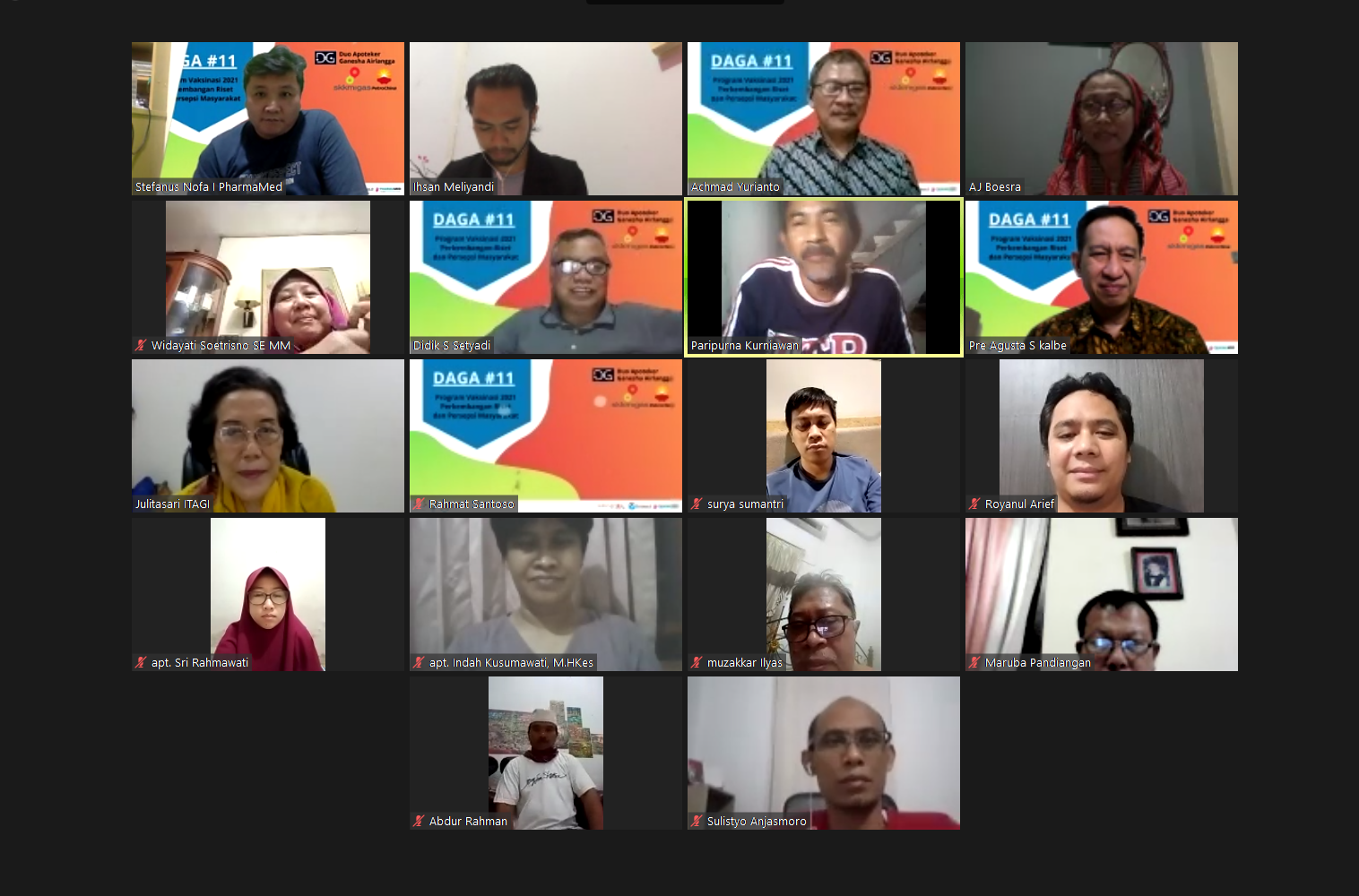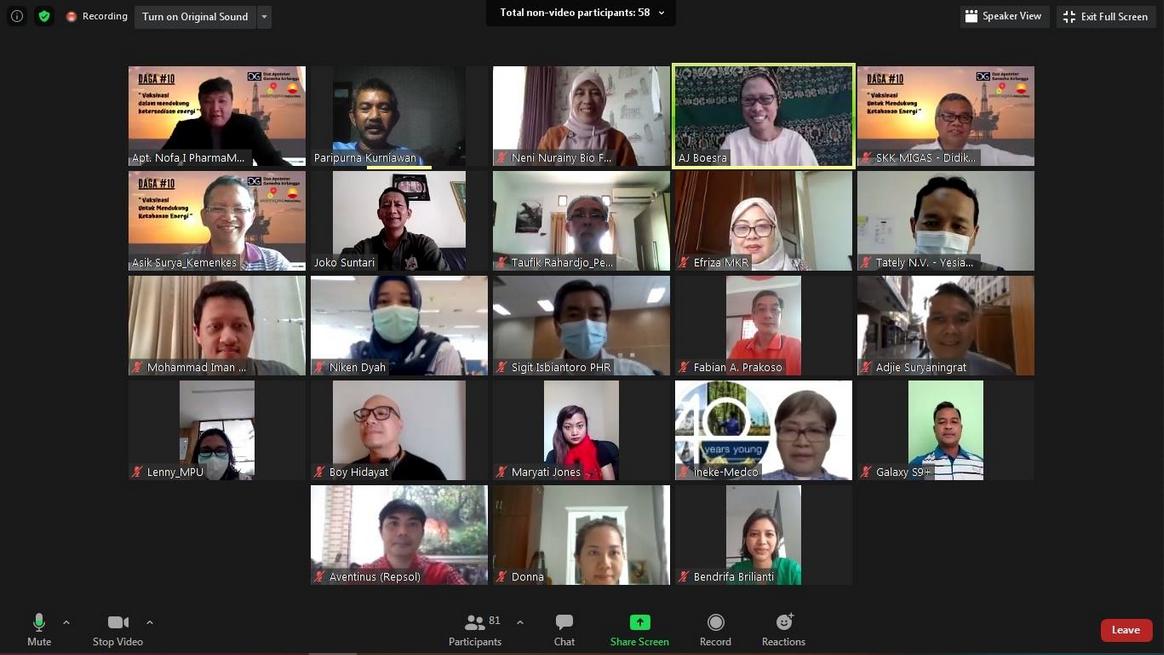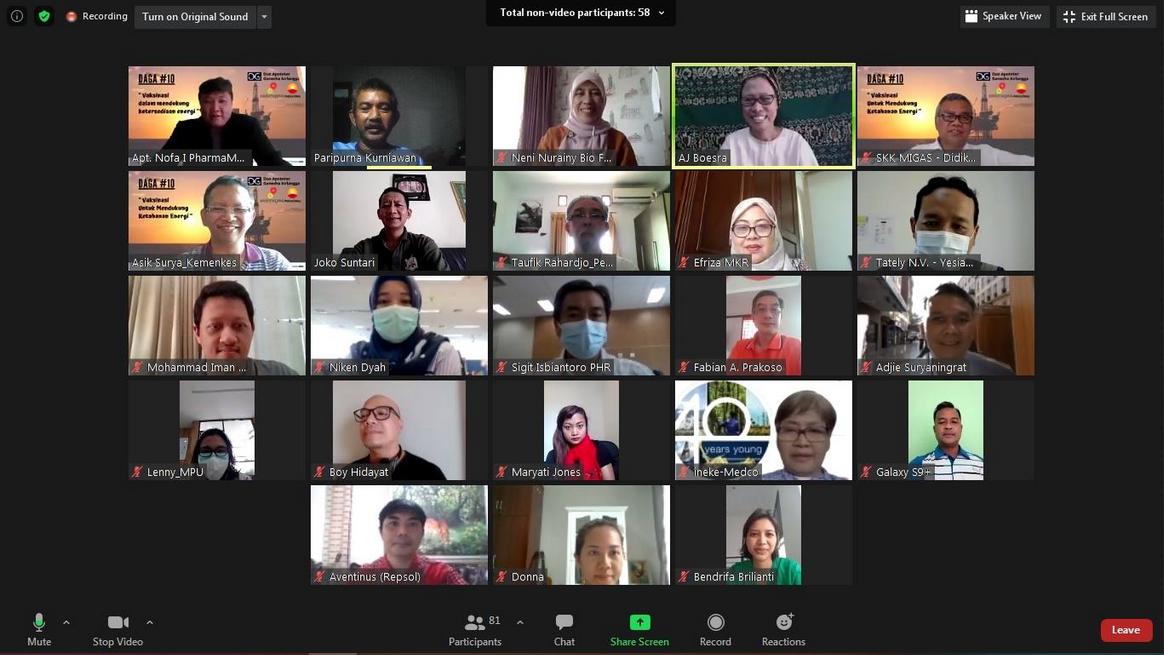At the November 27 event, SKK Migas Formality Division head Didik Sasono Setyadi gave the keynote speech. Other speakers were Asik Surya from the Health Ministry’s health surveillance and quarantine directorate as well as pharmacist and researcher Neni Nurainy from state-owned pharmacy giant PT Biofarma.
In his speech, Didik said that everyone in the upstream oil and gas industry would fully support the government’s Covid-19 vaccination program. “We have to work together to end the pandemic. Through vaccination, the health of upstream oil and gas workers will be ensured. This is key to safeguarding Indonesia’s energy security in the future,” he said.
“Furthermore, we have transportation and medical facilities, as well as doctors and paramedics. It is possible to use these facilities if the country needs them. After all, they are national assets,” he added.
Asik said that the Covid-19 pandemic had devastated the global healthcare system, even in superpower countries. “However, the pandemic is also a blessing in disguise, as it has led to a surge of global solidarity and partnership in the search for vaccines,” he said.
Both Asik and Neni cited a public perception survey on Covid-19 vaccination, conducted in September this year by the Health Ministry and the Indonesian Technical Advisory Group on Immunization (ITAGI) with support from WHO and UNICEF.
The result of the survey, which involved 115,000 respondents in all of Indonesia’s 34 provinces, was released by the ministry on Nov. 17. It shows that 64.81 percent of respondents are willing to be vaccinated, while the rest are either having doubts on or refusing Covid-19 vaccination. Religious belief, general distrust of vaccines and fear of side effects are cited as reasons of doubts or refusal.
In response to these findings, Asik said that good public communication campaign would be necessary, including on the potential risks of Covid-19 vaccines. “This will make the Covid-19 vaccination program more effective,” he said.
Neni said that time, cost and scalability and access were the major challenges in vaccine development during a pandemic. However, there has been encouraging progress in Covid-19 vaccine development so far.
“For instance, today we have better technologies, new approaches and special schemes for regulation relaxation to deal with time constraints. We also now have global funding consortiums to address the cost issue,” Neni explained.
Problems on scalability and access have to do with the capacity required to produce and distribute vaccines for over 7 billion people worldwide. “Global partnerships are key in addressing these problems,” Neni said, adding that Indonesia is part of such partnerships.
These discussions were then followed up on the Dec. 4 event. Didik spoke again at the event. This time, he was accompanied by Ministry of Health senior official Achmad Yurianto, PT Kalbe Farma pharma research and development director Pre Agusta Siswantoro and Indonesian Technical Advisory Group on Immunization (ITAGI) executive secretary Julitasari Sundoro.
Pre Agusta explained that vaccine producers were facing pressures to produce a huge amount of vaccines in a short time. He reiterated Asik’s point that public perception would remain a challenge in Covid-19 vaccination. “We will not be able to achieve our goal if some people refuse vaccination.”
Julitasari said that ITAGI would submit recommendation to the government following its aforementioned public perception survey on Covid-19 vaccination. “For example, in Aceh, the biggest reason behind vaccine refusal is related to their halal status. Therefore, we recommend an approach by the Indonesian Ulema Council [MUI] to local communities to ensure successful vaccination,” she said.
According to her, ITAGI’s recommendations aimed to help the government tailor proper communication strategies for different communities across Indonesia.
The government has stipulated that the Covid-19 vaccines for mass use in Indonesia must come from local pharma giant PT Bio Farma, UK-based AstraZeneca, China’s Sinopharm or Sinovac Biotech and US pharma Moderna. The vaccine jointly produced by US firm Pfizer and German company BioNTech also made the list.
Yurianto said that the locally-produced vaccine, dubbed “Merah Putih” vaccine, would soon undergo phase-3 clinical trial and be available for use in 2022. He mentioned that the vaccines from Pfizer and Moderna would pose a distribution challenge in Indonesia. “These vaccines required ultra-cold chain storage. Distribution to remote regions and storage at local community health centers can be really difficult,” said Yurianto.
The weekly webinar is held on Friday, from 7 p.m. to 9 p.m.




SKK Migas – PetroChina Support Weekly Webinars to Promote Covid-19 Vaccination